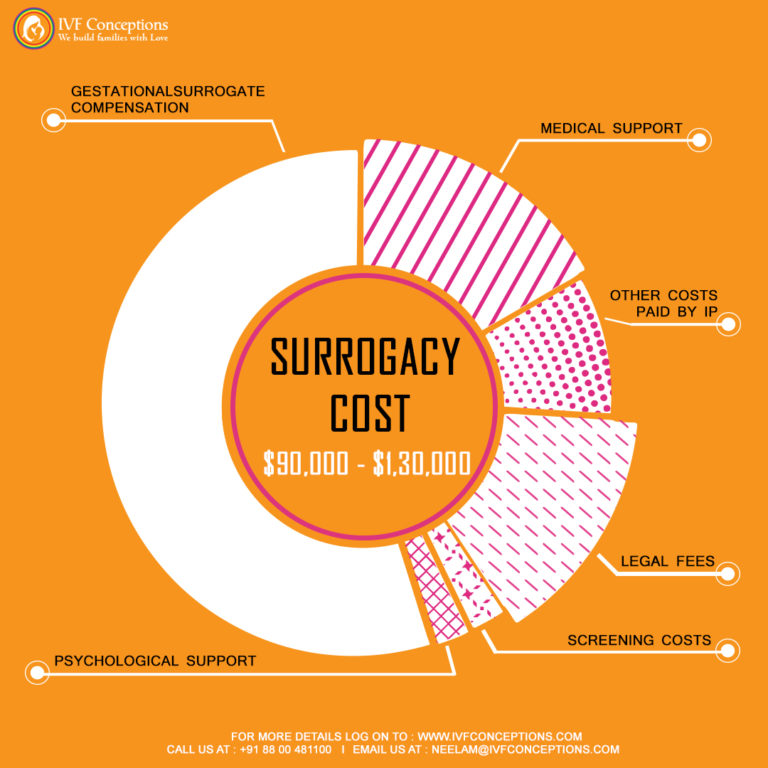Surrogacy Expenses Explained- Guide for Intended Parents


Surrogacy is a popular option for couples who are unable to conceive a child naturally. However, the 3 can be a significant barrier for many families. In this blog post, we will explore the various factors that contribute to the cost of surrogacy and provide a comprehensive breakdown of the expenses involved.
Contact us directly for a free consultation!🤝
📲 +91-8800481100 ( WhatsApp, Line, Viber)
Additional Resources:
Everything You Need To Know (in 2023)
How Much Does Surrogacy Cost Using Family Member
Can My Insurance Provider Pay My Surrogacy Costs?
How Much Does Surrogacy Cost in the USA ( 2023)?
Surrogacy Costs Breakdown for Intended Parents


How much does surrogacy cost in the USA?
Surrogacy is a complex process that involves various expenses, including medical, legal, and agency fees, surrogate compensation, and insurance coverage. The cost of surrogacy can vary significantly depending on the destination country, the specific program, and the services included.
For example, the cost of surrogacy in the United States ranges from $130,000 to $160,000, while international surrogacy can cost as little as $50,000 in Eastern Europe or South America.
Factors that affect the cost of international surrogacy include the destination country, medical, legal, and agency fees, surrogate compensation, screening and support services, and insurance coverage.
It’s important for intended parents to carefully consider these factors and thoroughly research the costs and regulations in their chosen destination before pursuing surrogacy. Seeking guidance from experienced professionals can help in understanding the full scope of costs and making informed decisions.
Factors that Affect the Cost of Surrogacy
The cost of surrogacy can vary depending on several factors. Some of the factors that affect the cost of surrogacy include:
– Legal services: Legal fees can be a significant expense in the surrogacy process. Intended parents will need to work with a lawyer to create the necessary documents that outline the terms of the surrogacy agreement.
– Medical expenses: Medical expenses can include the cost of in vitro fertilization (IVF), embryo creation, and other medical procedures required for the surrogacy process.
– Surrogate compensation: Surrogate compensation is one of the most significant expenses in the surrogacy process. Surrogates are compensated for their time, effort, and the risks associated with carrying a child.
– Surrogacy agency fees: Surrogacy agencies provide a range of services, including matching intended parents with surrogates, managing the surrogacy process, and providing support throughout the journey. These services come at a cost, and surrogacy agency fees can vary widely.
– Travel expenses: Travel expenses can include the cost of travel for the surrogate, intended parents, and medical professionals involved in the surrogacy process.
– Use of donor eggs or sperm: The use of donor eggs or sperm can add to the cost of surrogacy.
– Number of IVF cycles to achieve pregnancy: The number of IVF cycles required to achieve pregnancy can impact the overall cost of surrogacy.
– Use of additional techniques like PGT: The use of additional techniques like preimplantation genetic testing (PGT) can add to the cost of surrogacy.
– State where the surrogacy is pursued: The cost of surrogacy can vary depending on the state where the surrogacy is pursued.
Surrogacy Cost Breakdown
According to various sources, the cost of surrogacy in the US ranges from $110,000 to $170,000, including agency fees, surrogate compensation, legal fees, and medical costs. However, the cost can vary depending on individual arrangements and circumstances.
Here is a breakdown of the potential expenses involved in the surrogacy process:
– 
 Legal fees: $7,000 to $15,000
Legal fees: $7,000 to $15,000
– Medical expenses: $20,000 to $50,000
– Surrogate compensation: $30,000 to $50,000
– Surrogacy agency fees: $20,000 to $30,000
– Travel expenses: $5,000 to $10,000
– Use of donor eggs or sperm: $10,000 to $20,000
– Number of IVF cycles to achieve pregnancy: $10,000 to $20,000
– Use of additional techniques like PGT: $5,000 to $10,000
Low-Cost Surrogacy Options
For families who are unable to afford the high cost of surrogacy, there are some low-cost surrogacy options available. These include:
- Surrogacy grants: Some organizations offer surrogacy grants to help families cover the cost of surrogacy.
- Surrogacy financing: Some surrogacy agencies offer financing options to help families pay for the cost of surrogacy over time.
- Surrogacy cost-saving tips: Families can save money on surrogacy by negotiating fees, choosing a surrogate who lives nearby, and using a surrogate who has already had a successful pregnancy.
How can intended parents finance surrogacy expenses
Financing options for surrogacy include personal loans, grants, fundraising, and fertility financing loans. It’s important for intended parents to carefully consider these factors and thoroughly research the costs and regulations in their chosen destination before pursuing surrogacy. Seeking guidance from experienced professionals can help in understanding the full scope of costs and making informed decisions.
How intended parents can finance surrogacy expenses:
- Personal Loans: Intended parents commonly rely on loans to help cover the costs of surrogacy. This can include traditional lines of credit, like home equity loans, credit cards, and loans specifically for fertility treatments.
- Grants and Fundraising: Many intended parents apply for grants and organize fundraising events to offset surrogacy costs. Community fundraising events and surrogate and fertility grant programs are excellent ways to fund a surrogacy journey.
- Fertility Financing Loans: Certain financial organizations specialize in fertility financing, offering loans specifically for fertility treatments and surrogacy. Many lenders provide loans to couples looking for gestational surrogacy financing.
- Insurance Coverage: Evaluating the medical costs covered by insurance and researching options for insuring the surrogate and the baby can help manage surrogacy expenses.
- Family Support: Borrowing money from friends and family is another option to help fund the surrogacy journey. Some relatives are willing to provide a personal loan or financial support.
- Budgeting and Planning: Meeting with a financial planner to discuss family-building goals, setting savings goals, and creating a budget for the surrogacy journey can help manage expenses.
- Evaluating Costs: Understanding the various expenses involved in surrogacy, such as agency fees, medical costs, insurance coverage, and legal and administrative expenses, can help intended parents make well-informed financial decisions.
These financing options can help intended parents manage the significant investment involved in the surrogacy process. It’s important to carefully research each option and consider the specific financial circumstances before making decisions.
Surrogacy costs resources worldwide:
Top 4 cheapest countries for surrogacy
Best Countries for Surrogacy 2023- Top International Destinations
Risks of international surrogacy
Global International Surrogacy Options
Surrogacy In Mexico-Everything Intended Parents Need To Know
Cheapest Country For Gay Surrogacy- Colombia
Low-cost surrogate mother in Argentina
Low-cost surrogate mother in Kazakhstan
Tips to reduce the surrogacy cost?
Here’s a listicle on how intended parents can reduce the costs of surrogacy:
- Choose a Reputable Agency: Selecting a trustworthy surrogacy agency can help ensure that the process is managed efficiently, potentially reducing the risk of unexpected costs and delays.
- Consider a Friend or Family Member as a Surrogate: Asking a friend or family member to carry the baby can significantly reduce surrogacy costs, as it eliminates the need to pay a surrogate.
- Evaluate Insurance Coverage: Understanding the medical costs covered by insurance and researching options for insuring the surrogate and the baby can help manage surrogacy expenses.
- Consider International Surrogacy: Exploring surrogacy options in countries with lower costs, such as Ukraine or Georgia, can significantly reduce the overall expenses associated with surrogacy.
- Flex Spending Account: Putting the maximum amount possible into a Flex Spending Account can help cover medical expenses related to surrogacy.
- Tax Write-Offs: Some medical expenses related to surrogacy may be tax-deductible. Consulting with an accountant can help identify potential tax benefits.
- Negotiate Medical Bills: Negotiating medical bills and paying for certain medical expenses in cash can help reduce costs associated with surrogacy.
- Side Hustle: Finding a second job or a side hustle can provide additional income to offset the costs of surrogacy.
- Borrowing from Friends and Family: Some relatives may be willing to provide a personal loan or financial support to help fund the surrogacy journey.
- Budgeting and Planning: Meeting with a financial planner to discuss family-building goals, setting savings goals, and creating a budget for the surrogacy journey can help manage expenses.


Conclusion for Surrogacy Expenses Explained
The cost of surrogacy can vary significantly depending on various factors, including the destination country, medical, legal, and agency fees, surrogate compensation, and insurance coverage. The average cost of surrogacy in the United States ranges from $130,000 to $160,000, while international surrogacy can cost as little as $50,000 in Eastern Europe or South America.
Factors that affect the cost of surrogacy include the number of cycles until successful conceiving, medical costs, insurance coverage, and legal and administrative expenses.
It’s important for intended parents to carefully consider these factors and thoroughly research the costs and regulations in their chosen destination before pursuing surrogacy. Seeking guidance from experienced professionals can help in understanding the full scope of costs and making informed decisions.
If you’d like to learn more about IVF, Egg Donation, or surrogacy services globally, check out the rest of our website at IVF Conceptions. We offer legally secure and affordable surrogacy consulting services for FREE.
Here is a table of the cheapest countries for surrogacy:
| Country | Regulation & Organization | Who are allowed to participate | Surrogacy Cost | Legal Assurance |
| Colombia | Altruistic | Singles, gay couples, hetero couples | Affordable
$70,000 |
Reliable |
| Mexico | Altruistic | Singles, gay couples, hetero couples | Affordable
$70,000 to $80,000 |
Reliable |
| USA | Commercial | Singles, gay couples, hetero couples | Costly
$150,000+ |
Strong |
| Ukraine | Commercial | Hetero couples | Affordable
$60,000 |
Strong |
| Georgia | Commercial | Hetero couples | Affordable
$60,000 |
Strong
|
| Greece | Altruistic | Hetero couples and single women | Affordable
$80,000 |
Strong |
Contact us directly for a free consultation!🤝
📲 +91-8800481100 ( WhatsApp, Line, Viber)

 FAQs: Surrogacy Expenses Explained – Guide for Intended Parents
FAQs: Surrogacy Expenses Explained – Guide for Intended Parents
1. What are the typical costs involved in a surrogacy journey?
The cost of surrogacy generally includes agency fees, legal fees, surrogate compensation, medical expenses (IVF treatments, pregnancy care, delivery), insurance, and miscellaneous costs like travel and accommodation. The total can range between $80,000 and $150,000 depending on the country and specific arrangements.
2. How does the surrogate’s compensation break down?
Surrogate compensation usually covers a base fee for carrying the baby, plus additional payments for milestones like embryo transfer, maternity clothing, or potential risks such as carrying multiples. Compensation varies depending on the surrogate’s experience and the location.
3. Are medical costs covered in surrogacy agreements?
Yes, medical costs such as IVF treatments, prenatal care, and delivery are generally covered in the surrogacy agreement. In some cases, intended parents must also provide health insurance for the surrogate.
4. Do intended parents need to pay for legal services?
Yes, legal fees are a significant part of surrogacy expenses. Both intended parents and the surrogate need independent legal representation to draft and review the surrogacy agreement, ensuring all parties’ rights are protected.
5. Can surrogacy be covered by insurance?
Some insurance policies may cover certain medical procedures for the surrogate, but in many cases, a supplemental insurance policy specifically for surrogacy is needed. It’s important to verify coverage options early in the process.
6. How much do agency fees cost?
Agency fees can range from $15,000 to $30,000. These fees cover services like surrogate matching, case management, and emotional support throughout the surrogacy journey.
7. Are there additional costs if the surrogate lives in a different country or state?
Yes, if the surrogate lives in another country or state, intended parents may face additional travel expenses for medical appointments, delivery, and legal processes. International surrogacy may also include extra legal and logistical fees.
8. What are escrow or trust account fees?
Surrogacy agreements often require funds to be held in an escrow or trust account to ensure timely payments to the surrogate and other parties. Setting up and managing this account typically costs between $1,000 and $2,500.
9. Can intended parents take out loans or financing for surrogacy?
Yes, many intended parents choose to finance their surrogacy journey through personal loans, surrogacy-specific loan programs, or payment plans offered by surrogacy agencies.
10. Are there ways to reduce surrogacy costs?
Some intended parents reduce costs by working with a friend or family member as a surrogate, or by exploring international surrogacy in countries with lower overall costs. However, it’s essential to balance cost savings with legal protections and medical care quality.
11. How can intended parents prepare for unexpected costs during surrogacy?
It’s advisable to set aside 10-20% of the total surrogacy budget for unforeseen expenses, such as additional medical treatments, travel changes, or complications that may arise during the pregnancy or legal processes.
These FAQs provide a clear breakdown of the common questions intended parents might have when navigating the financial aspects of surrogacy.